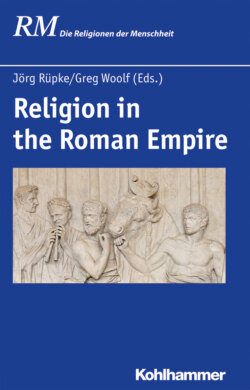Religion in the Roman Empire

Реклама. ООО «ЛитРес», ИНН: 7719571260.
Оглавление
Группа авторов. Religion in the Roman Empire
Contents
Introduction: Living Roman Religion
1 Approaching Roman Religion
2 The Idea of Religion
3 Lived Ancient Religion
4 The Story of Rome
5 Themes and Methods
Bibliography
Empire as a field of religious action
1 A Religion of the Empire?
2 Emperors in the Religious life of the Roman World
3 Empire as an interaction sphere
4 The Empire in the World
5 Empire and Religions
Bibliography
The City as a Field of Religious Action: Manufacturing the Divine in Pompeii
1 A city full of gods
2 The Gods in Action
3 Working with the Gods
4 Conclusion
Bibliography
Sanctuaries – places of communication, knowledge and memory in Roman religion
1 Sanctuaries – places for people and gods
2 The role of sanctuaries in an empire full of differences
2.1 New temples and gods under new rulers
2.2 Villages, towns and regions: spatial-religious references and regional traditions in sanctuaries
2.3 Sanctuaries as places of permanence, political appropriation and religious change
3 Costs, events and experiences: Visitors, users and religious specialists in a sanctuary
3.1 Space for experience—personal needs and religious experience
3.2 Oracles, healing and life counselling
3.3 Great feasts and great gifts
4 Collection of knowledge and objects – sanctuaries in the dynamic between memory and oblivion
Bibliography
People and Competencies
1 Introduction
2 Public priests
3 Divination, diviners and the diagnostic value of signs
4 Oracular officials in the Eastern Roman Provinces
5 Anchoring religious innovation
6 Small-group religious entrepreneurs
7 Developing a priestly role in Christ-centred imaginations
8 The philosophers as religious experts and henotheistic tendencies before Christianity
9 Setting borders to religious experts
Bibliography
The Gods and Other Divine Beings
1 Introduction
2 The Gods and Roman ›Religion‹
3 Whose Roman Religion?
4 Interacting with Divine Beings in the Roman World
5 Intellectualizing Religious Experts
Bibliography
Managing problems: Choices and solutions
1 Introduction
2 Mainstream options
2.1 Healing waters, therapeutic dreams
2.2 Divinatory shrines
2.2.1 Oracles, mainly in Italy
2.2.2 The eastern Mediterranean
2.3 Settling the dead
2.3.1 Monumentum and sepulcrum
2.3.2 Ritual meals
3 Minor ritual specialists
4 Self-help
5 Conclusion
Bibliography
Artefacts and their humans: Materialising the history of religion in the Roman world
1 Introduction: From (Late) Prehistoric to Roman
2 Artefacts and religious change in the Roman world
3 Objects, affordances, and religion
4 Objectscape and semiotic form
5 How new objects and materials change religious practices: automata
6 Religion in the Empire of things
7 Beyond wood
8 With terracotta (and double moulds)
9 Through marble and caementicium
10 Led by lead
11 Conclusion
Bibliography
The Impact of Textual Production on the Organisation and Proliferation of Religious Knowledge in the Roman Empire
1 Introduction
2 Calendars: Appropriating Time and Systematizing Religious Action
3 Controlling ›Religion‹: Legalization and Ratification of Religious Knowledge
4 Re-framing ›Religion‹: Exegesis, Appropriation and Translation as Means of Reiterating Old and Propagating New Religious Ideas
5 Texts and Rituals in the Second Century CE: A Century of Intense Religious Experimentation
6 ›Religion‹ as Philosophy in the Second Sophistic
7 Martyrologies: Textualizing Death and Embodying devotio
Bibliography
Economy and Religion
1 Introduction
1.1 The wider context: the demography and macro-economy of the Roman Empire
1.2 Implications for expenditure on religious activity
2 Income, outgoings and the nature of the evidence
3 Public versus private: an unhelpful opposition?29
4 Funding civic and imperial religion
4.1 Standing revenues of sanctuaries and their protection
4.2 Revenues from sacrifice
4.3 Regular income from non-agricultural sources
4.4 Variable income: patronage
4.5 Income versus wealth
5 The finances of associations and small religious groups
6 Pilgrimage as an economic factor
6.1 Competition stimulates business
6.2 Infrastructure and services in and around pilgrimage sites
7 Conclusion
Bibliography
Abbreviations
Figures
Index. Places
Names
Keywords
Отрывок из книги
Die Religionen der Menschheit
Begründet vonChristel Matthias Schröder
.....
3 Objects, affordances, and religion
4 Objectscape and semiotic form
.....